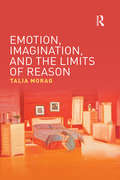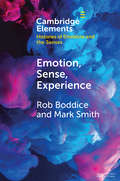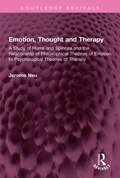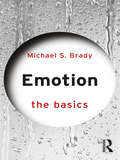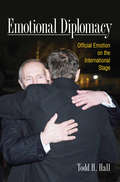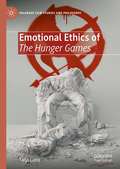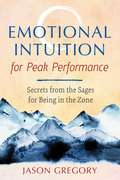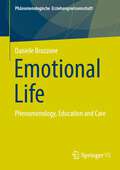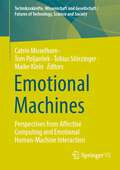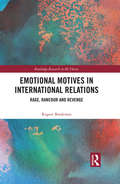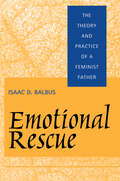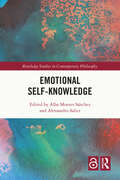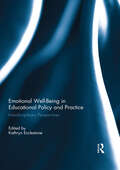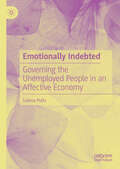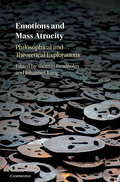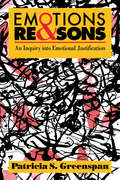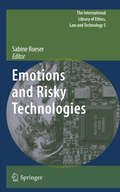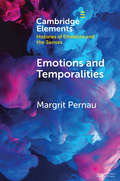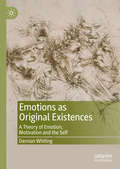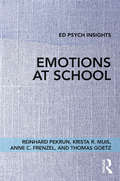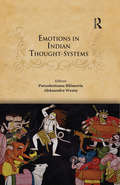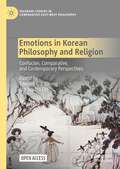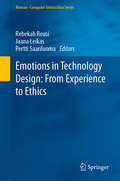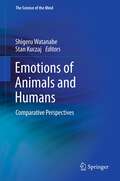- Table View
- List View
Emotion, Imagination, and the Limits of Reason
by Talia MoragThe emotions pose many philosophical questions. We don't choose them; they come over us spontaneously. Sometimes emotions seem to get it wrong: we experience wrongdoing but do not feel anger, feel fear but recognise there is no danger. Yet often we expect emotions to be reasonable, intelligible and appropriate responses to certain situations. How do we explain these apparent contradictions? Emotion, Imagination, and the Limits of Reason presents a bold new picture of the emotions that challenges prevailing philosophical orthodoxy. Talia Morag argues that too much emphasis has been placed on the "reasonableness" of emotions and far too little on two neglected areas: the imagination and the unconscious. She uses these to propose a new philosophical and psychoanalytic conception of the emotions that challenges the perceived rationality of emotions; views the emotions as fundamental to determining one's self-image; and bases therapy on the ability to "listen" to one’s emotional episode as it occurs. Emotion, Imagination, and the Limits of Reason is one of the first books to connect philosophical research on the emotions to psychoanalysis. It will be essential reading for those studying ethics, the emotions, moral psychology and philosophy of psychology as well as those interested in psychoanalysis.
Emotion, Sense, Experience (Elements in Histories of Emotions and the Senses)
by Mark Smith Rob BoddiceEmotion, Sense, Experience calls on historians of emotions and the senses to come together in serious and sustained dialogue. The Element outlines the deep if largely unacknowledged genealogy of historical writing insisting on a braided history of emotions and the senses; explains why recent historical treatments have sometimes profitably but nonetheless unhelpfully segregated the emotions from the senses; and makes a compelling case for the heuristic and interpretive dividends of bringing emotions and sensory history into conversation. Ultimately, we envisage a new way of understanding historical lived experience generally, as a mutable product of a situated world-brain-body dynamic. Such a project necessarily points us towards new interdisciplinary engagement and collaboration, especially with social neuroscience. Unpicking some commonly held assumptions about affective and sensory experience, we re-imagine the human being as both biocultural and historical, reclaiming the analysis of human experience from biology and psychology and seeking new collaborative efforts.
Emotion, Thought and Therapy: A Study of Hume and Spinoza and the Relationship of Philosophical Theories of Emotion to Psychological Theories of Therapy (Routledge Revivals)
by Jerome NeuFirst published in 1977, Emotion, Thought and Therapy is a study of Hume and Spinoza and the relationship of philosophical theories of the emotions to psychological theories of therapy. Jerome Neu argues that the Spinozists are closer to the truth; that is, that thoughts are of greater importance than feelings in the classification and discrimination of emotional states. He then contends that if the Spinozists are closer to the truth, we have the beginning of an argument to show that Freudian or analytic therapies make philosophic sense. Throughout the book, careful attention is paid to modern discussions in philosophy of mind and psychology, and materials from anthropology and other relevant disciplines are considered. At the centre of the discussion is the notion of ‘thought-dependence’. Therapies for psychological disorders are placed along a spectrum in accordance with the role they assign to thoughts. The Spinozist view of the emotions can be seen as at the extreme thought end of a corresponding spectrum of theories of the emotions. The book suggests that this stream may help explain the spectrum of therapeutic theories and the possibilities that exist for psychological development and change. This book will be of interest to students of philosophy, psychology and counselling.
Emotion: The Basics (The Basics)
by Michael BradyWhile human beings might be rational animals, they are emotional animals as well. Emotions play a central role in all areas of our lives and if we are to have a proper understanding of human life and activity, we ought to have a good grasp of the emotions. Michael S. Brady structures Emotion: The Basics around two basic, yet fundamental, questions: What are emotions? And what do emotions do? In answering these questions Brady provides insight into a core component of all our lives, covering: the nature of emotion; emotion, knowledge, and understanding; emotion and action; emotions and social groups; emotion, morality, and art. In this concise and insightful introduction, Brady explains why we are often better off as a result of emotion rather than reason being in the driving seat, as our lives, both individual and social, would be significantly impoverished without the emotions. With a glossary of key terms and suggestions for further reading, Emotion: The Basics is an ideal starting point for anyone seeking a full introduction to the philosophical study of emotion.
Emotional Diplomacy: Official Emotion on the International Stage
by Todd H. HallIn Emotional Diplomacy, Todd H. Hall explores the politics of officially expressed emotion on the international stage, looking at the ways in which state actors strategically deploy emotional behavior to shape the perceptions of others. Examining diverse instances of emotional behavior, Hall reveals that official emotional displays are not simply cheap talk but rather play an important role in the strategies and interactions of state actors. Emotional diplomacy is more than rhetoric; as this book demonstrates, its implications extend to the provision of economic and military aid, great-power cooperation, and even the use of armed force. Emotional Diplomacy provides the theoretical tools necessary for understanding the nature and significance of state-level emotional behavior and offers new observations of how states seek reconciliation, strategically respond to unforeseen crises, and demonstrate resolve in the face of perceived provocations. Hall investigates three specific strands of emotional diplomacy: those rooted in anger, sympathy, and guilt. Presenting original research drawing on sources and interviews in five different languages, Hall provides new insights into the 1995–1996 Taiwan Strait Crisis, the post-9/11 reactions of China and Russia, and relations between West Germany and Israel after World War II. He also demonstrates how his arguments can be extended to further cases ranging from Sino-Japanese relations to diplomatic interactions in Latin America. Emotional Diplomacy offers a unique take on the intersection of strategic action and emotional display, offering a means for making sense of why states appear to behave emotionally.
Emotional Ethics of The Hunger Games (Palgrave Film Studies and Philosophy)
by Tarja LaineEmotional Ethics of The Hunger Games expands the ‘ethical turn’ in Film Studies by analysing emotions as a source of ethical knowledge in The Hunger Games films. It argues that emotions, incorporated in the thematic and aesthetic organization of these films, reflect a crisis in moral standards. As such they cultivate ethical attitudes towards such phenomena as totalitarianism, the culture of reality television, and the society of spectacle. The focus of the argument is on cinematic aesthetics, which expresses emotions in a way that highlights their ethical significance, running the gamut from fear through guilt and shame, to love, anger and contempt. The central claim of the book is that these emotions are symptomatic of some moral conflict, which renders The Hunger Games franchise a meaningful commentary on the affective practice of cinematic ethics. ‘’The Hunger Games movies have become iconic symbols for resistance across the globe. Tarja Laine proposes that this is not caused by their status as exciting cinematic spectacles, but by their engaging our emotions. Laine uses The Hunger Games as key texts for understanding our world, demonstrating that ethics do not originate from rational considerations, far removed from those mucky things called emotions. But rather that emotions are at the core of cinematic ethics.”—William Brown, Author of Supercinema: Film-Philosophy for the Digital Age ‘’In this elegantly written exploration of the relationship between aesthetics and emotion in The Hunger Gamestrilogy, Tarja Laine illuminates the power of film to embody ethical conflict. Deftly interweaving film-philosophy and close analysis, Laine traces how these films mobilise complex emotions, nuancing our thinking about cinema and the spectator. Laine’s book takes The Hunger Games films seriously, demonstrating with verve why they matter.”—Catherine Wheatley, Senior Lecturer in Film Studies, King’s College London, UK ''In this fresh, engaging, and insightful study of The Hunger Games film trilogy, Tarja Laine explores the crucial role that emotions play in appreciation of the ethical qualities of the movies. She forges productive dialogues between a range of film theory, scholarship on moral philosophy, and debates on ethics, as she performs a multi-layered investigation of the aesthetic qualities of the trilogy, the multiple emotions embodied in these qualities, and the philosophical-ethical insights that are in turn embedded in these emotions. The cinematic connection between emotions and ethics that emerges through Laine’s detailed textual analyses confronts us with complex moral dilemmas while enriching our aesthetic experience.'' —Sarah Cooper, Professor, Film Studies Department, King's College London, UK
Emotional Intuition for Peak Performance: Secrets from the Sages for Being in the Zone
by Jason GregoryReveals a structured mind-body system for cultivating effortless action and intelligent spontaneity for peak performance • Details 4 fundamental habits and routines that are essential for developing peak performance and explains how to incorporate them into daily life • Explains the cognitive science behind the development of expert skills and how the teachings of ancient Eastern sages align with these scientific findings • Offers practices for cultivating physical and mental intelligence, fasting the mind, and harnessing creativity to achieve your desires Integrating the wisdom of the ancient sages with modern science, Jason Gregory explains how world-class artists and athletes reach peak performance--and how you, too, can harness this &“lifestyle technology&” to make your actions effortless, enjoy intelligent spontaneity, and reach optimal performance at a peak level. Drawing on modern cognitive science, Gregory explains dual process theory, which divides mental activity into two spheres: cold cognition, analogous with rational thought, and hot cognition, based on emotional intuition--a theory anticipated by ancient Eastern thought, especially the teachings of the Chinese sages. The author explains that peak performance is impossible to achieve by relying solely on cold cognition as it cuts you off from the energy reserves necessary to excel. He shows how the athletic concept of being &“in the zone&” is based on practices that have become energized by hot cognition and thus instinctive. Outlining a structured training system that blends hot and cold cognition, the author identifies four fundamental habits and routines that lay the foundation for a healthy embodied mind and mindful body and thus are essential for developing peak performance and success. He explains how these training methods are practical applications of ancient wisdom from Zen and Taoist traditions, such as wu-wei, as well as how they are supported by recent medical research. Building on the four fundamentals, he offers practices for cultivating physical and mental intelligence, fasting the mind, and harnessing creativity to achieve your desires. Gregory explains how, with regular practice, we can use the four fundamentals to create masterpiece days. And, as the masterpiece days compound, you build an unstoppable momentum where success is inevitable.
Emotional Life: Phenomenology, Education and Care (Phänomenologische Erziehungswissenschaft #14)
by Daniele BruzzoneThe human heart is, in many ways, an indecipherable enigma. The opposition of reason and passion has long prevented us from recognizing emotions and feelings as legitimate sources of knowledge. This book takes a deep dive into the rich phenomenology of affect, with a view to uncovering its essence and variety of forms: the experience of being “invaded” by an emotion is different to that of being “immersed” in a mood, just as being “guided” by a feeling does not mean being “swept away” by a passionate impulse. Hence the need for a systematic phenomenology of emotionality that can help us to appreciate such distinctions. The philosophical and pedagogical trajectory outlined in these pages provides education and healthcare practitioners – and indeed all those willing to improve their self-knowledge – with the key to a deeper understanding of the emotional life and its meaning for our existence.
Emotional Machines: Perspectives from Affective Computing and Emotional Human-Machine Interaction (Technikzukünfte, Wissenschaft und Gesellschaft / Futures of Technology, Science and Society)
by Catrin Misselhorn Tom Poljanšek Tobias Störzinger Maike KleinCan machines simulate, express or even have emotions? Is it a good to build such machines? How do humans react emotionally to them and how should such devices be treated from a moral point of view? This volume addresses these and related questions by bringing together perspectives from affective computing and emotional human-machine interaction, combining technological approaches with those from the humanities and social sciences. It thus relates disciplines such as philosophy, computer science, technology, psychology, sociology, design, and art. The volume offers readers interested in the phenomenon of emotional machines new perspectives from a variety of disciplines and addresses fundamental questions that will become pressing in the foreseeable future as emotional machines increasingly populate our everyday lives.
Emotional Motives in International Relations: Rage, Rancour and Revenge (Routledge Research in International Relations Theory)
by Rupert BrodersenThe study of emotions in International Relations is gaining wide-spread attention. Within the "emotional turn" in IR the emotion of rage however has not been given sufficient attention, instead being used as short-hand for irrationality and excess. Rage is arguably one of the oldest and most destructive emotions in human affairs. This book offers an innovative approach that seeks to split rage into its traditional manifestation of aggression and violence, and into a less visible, passive manifestation of Nietzschean Ressentiment. This model facilitates a comprehensive understanding of revisionist motivation, from the violence of ISIS to the oppositionism of Putin’s Russia. The aim is to illustrate how a lack of violence can belie vengeful impulses and a silent rage, and how acts of violence, regardless of brutality, are often framed as a type of justice and "moral imperative" in the mind of the aggressor. This book raises serious questions and concerns about legitimacy and order in global affairs, and offers a firm theoretical basis for the exploration of present day conflicts.
Emotional Rescue: The Theory and Practice of a Feminist Father (Thinking Gender Ser.)
by Isaac D. BalbusWeaving personal narrative with a synthesis of feminist mothering theory and psychoanalytic theories of narcissism, Isaac D. Balbus describes his effort to share in the care of his daughter during her first four years.
Emotional Self-Knowledge (Routledge Studies in Contemporary Philosophy)
by Alessandro Salice Alba Montes SánchezThis volume sheds light on the affective dimensions of self-knowledge and the roles that emotions and other affective states play in promoting or obstructing our knowledge of ourselves. It is the first book specifically devoted to the issue of affective self-knowledge. The relation between self-knowledge and human emotions is an often emphasized, but poorly articulated one. While philosophers of emotion tend to give affectivity a central role in making us who we are, the philosophical literature on self-knowledge focuses overwhelmingly on cognitive states and does not give a special place to the emotions. Currently there is little dialogue between both fields or with other philosophical traditions that have important contributions to make to this topic, such as phenomenology and Asian philosophy. This volume brings together philosophers from the relevant fields to explore two related sets of questions: First, do philosophers of emotion exaggerate the importance of our affective lives in making us who we are? Or is it philosophers of self-knowledge who misunderstand emotions? Second, what is the role of emotions in self-knowledge? What sort of self-knowledge can be secured by paying attention to our emotions? Emotional Self-Knowledge is an essential resource for researchers and advanced students working on philosophy of emotion, philosophy of mind, epistemology, philosophical psychology, and phenomenology.
Emotional Well-Being in Educational Policy and Practice: Interdisciplinary Perspectives
by Kathryn EcclestoneSchools in numerous countries around the world have become key sites for interventions designed to enhance the emotional well-being of children and young people, offering new forms of pedagogy and curriculum knowledge informed in ad hoc and eclectic ways by various strands of psychology, counselling and therapy.Responding to C. Wright Mills famous injunction for a ‘sociological imagination this unique inter-disciplinary collection of papers explores ideologies and imperatives that frame contemporary education policy and practice around emotional well-being, ideas and assumptions about the state of childhood today, and the changing nature of the curriculum subject and associated forms of knowledge. In bringing together British and American advocates of behavioural interventions in social and emotional learning alongside critics who draw on historical, philosophical and sociological perspectives, it highlights new and important debates for policy makers, the designers, implementers and evaluators of interventions and those who participate in them.This book was originally published as a special issue of Research Papers in Education.
Emotionally Indebted: Governing the Unemployed People in an Affective Economy
by Sabina PultzThis book explores the lived experience of unemployment from a critical social psychological perspective. It connects the condition of unemployment to governance structures and wider societal issues, such as the labor market tendencies of precarity and enterprise culture. Based on qualitative data collected in Denmark and America, the book gives voice to unemployed people to critically discuss both the intended and unintended consequences of active labor market measures, as well as the frequent moral evaluations that surround unemployment. The author explores how unemployed people make sense of and deal with the demands and activities required by activation policies or ALMPs, which tend to make the job seekers responsible for finding a solution to their condition. Building from the subjective experience of unemployment, it maps the complex emotional demands on jobseekers who should feel shame and self-blame but also display motivation and passion on the labor market. Presenting emotions and feelings as pivotal instruments of the governmentality of worklessness, this book addresses the lack of critical discussion and research into the unemployment experience and offers a useful, provocative perspective for students, scholars, and practitioners alike in social psychology, social policy, economic policy, and related disciplines.
Emotions and Mass Atrocity: Philosophical and Theoretical Explorations
by Thomas Brudholm Johannes LangThe study of genocide and mass atrocity abounds with references to emotions: fear, anger, horror, shame and hatred. Yet we don't understand enough about how 'ordinary' emotions behave in such extreme contexts. Emotions are not merely subjective and interpersonal phenomena; they are also powerful social and political forces, deeply involved in the history of mass violence. Drawing on recent insights from philosophy, psychology, history, and the social sciences, this volume examines the emotions of perpetrators, victims, and bystanders. Editors Thomas Brudholm and Johannes Lang have brought together an interdisciplinary group of prominent scholars to provide an in-depth analysis of the nature, value, and role of emotions as they relate to the causes and dynamics of mass atrocities. The result is a new perspective on the social, political, and moral dimensions of emotions in the history of collective violence and its aftermath.
Emotions and Reasons: An Inquiry into Emotional Justification
by Patricia S. GreenspanIn Emotions and Reasons, Patricia Greenspan offers an evaluative theory of emotion that assigns emotion a role of its own in the justification of action. She analyzes emotions as states of object-directed affect with evaluative propositional content possibly falling short of belief and held in mind by generalized comfort or discomfort.
Emotions and Risky Technologies
by Sabine RoeserBy offering an original and challenging approach to the topic of risk and emotion, this book covers new territory. It focuses on risk and emotion from the perspective of moral philosophy and emphasizes that emotions are an important source of moral knowledge.
Emotions and Temporalities (Elements in Histories of Emotions and the Senses)
by Margrit PernauThis Element brings together the history of emotions and temporalities, offering a new perspective on both. Time was often imagined as a movement from the past to the future: the past is gone and the future not yet here. Only present-day subjects could establish relations to other times, recovering history as well as imagining and anticipating the future. In a movement paralleling the emphasis on the porous self, constituted by emotions situated not inside but between subjects, this Element argues for a porous present, which is open to the intervention of ghosts coming from the past and from the future. What needs investigating is the flow between times as much as the creation of boundaries between them, which first banishes the ghosts and then denies their existence. Emotions are the most important way through which subjects situate and understand themselves in time.
Emotions as Original Existences: A Theory of Emotion, Motivation and the Self
by Demian WhitingThis book defends the much-disputed view that emotions are what Hume referred to as ‘original existences’: feeling states that have no intentional or representational properties of their own. In doing so, the book serves as a valuable counterbalance to the now mainstream view that emotions are representational mental states. Beginning with a defence of a feeling theory of emotion, Whiting opens up a whole new way of thinking about the role and centrality of emotion in our lives, showing how emotion is key to a proper understanding of human motivation and the self. Whiting establishes that emotions as types of bodily feelings serve as the categorical bases for our behavioural dispositions, including those associated with moral thought, virtue, and vice.The book concludes by advancing the idea that emotions make up our intrinsic nature - the characterisation of what we are like in and of ourselves, when considered apart from how we are disposed to behave. The conclusion additionally draws out the implications of the claims made throughout the book in relation to our understanding of mental illness and the treatment of emotional disorders.
Emotions at School (Ed Psych Insights)
by Thomas Goetz Reinhard Pekrun Krista R. Muis Anne C. FrenzelFor more than a decade, there has been growing interest in the role of emotions in academic settings. Written by leading experts on learning and instruction, Emotions at School focuses on the connections between educational research and emotion science, bringing the subject to a wider audience. With chapters on how emotions develop and work, evidence-based recommendations about how to foster adaptive emotions, and clear explanations of key concepts and ideas, this concise volume is designed for any education course that includes emotions in the curriculum. It will be indispensable for student researchers and both pre- and in-service teachers alike.
Emotions in Indian Thought-Systems
by Purushottama Bilimoria; Aleksandra WentaA stimulating account of the wide range of approaches towards conceptualising emotions in classical Indian philosophical–religious traditions, such as those of the Upanishads, Vaishnava Tantrism, Bhakti movement, Jainism, Buddhism, Yoga, Shaivism, and aesthetics, this volume analyses the definition and validity of emotions in the construction of
Emotions in Korean Philosophy and Religion: Confucian, Comparative, and Contemporary Perspectives (Palgrave Studies in Comparative East-West Philosophy)
by Edward Y. J. Chung Jea Sophia OhThis pioneering book presents thirteen articles on the fascinating topic of emotions (jeong 情) in Korean philosophy and religion. Its introductory chapter comprehensively provides a textual, philosophical, ethical, and religious background on this topic in terms of emotions West and East, emotions in the Chinese and Buddhist traditions, and Korean perspectives. Chapters 2 to 5 of part I discuss key Korean Confucian thinkers, debates, and ideas. Chapters 6 to 8 of part II offer comparative thoughts from Confucian moral, political, and social angles. Chapters 9 to 12 of part III deal with contemporary Buddhist and eco-feminist perspectives. The concluding chapter discusses ground-breaking insights into the diversity, dynamics, and distinctiveness of Korean emotions.This is an open access book.
Emotions in Technology Design: From Experience to Ethics (Human–Computer Interaction Series)
by Pertti Saariluoma Jaana Leikas Rebekah RousiUnderstanding emotions is becoming ever more valuable in design, both in terms of what people prefer as well as in relation to how they behave in relation to it. Approaches to conceptualising emotions in technology design, how emotions can be operationalised and how they can be measured are paramount to ascertaining the core principles of design. Emotions in Technology Design: From Experience to Ethics provides a multi-dimensional approach to studying, designing and comprehending emotions in design. It presents emotions as understood through basic human-technology research, applied design practice, culture and aesthetics, ethical approaches to emotional design, and ethics as a cultural framework for emotions in design experience. Core elements running through the book are: cognitive science – cognitive-affective theories of emotions (i.e., Appraisal); culture – the ways in which our minds are trained to recognise, respond to and influence design; and ethics – a deep cultural framework of interpretations of good versus evil. This ethical understanding brings culture and cognition together to form genuine emotional experience. This book is essential reading for designers, technology developers, HCI and cognitive science scholars, educators and students (at both undergraduate and graduate levels) in terms of emotional design methods and tools, systematic measurement of emotion in design experience, cultural theory underpinning how emotions operate in the production and interaction of design, and how ethics influence basic (primal) and higher level emotional reactions. The broader scope equips design practitioners, developers and scholars with that ‘something more’ in terms of understanding how emotional experience of technology can be positioned in relation to cultural discourse and ethics.
Emotions in the Moral Life
by Robert C. RobertsRobert C. Roberts extends to the moral life the account of emotions presented in his Emotions: An Essay in Aid of Moral Psychology (2003), that they are "concern-based construals." In this book the author explains how emotions can be a basis for moral judgments, how they account for the deeper moral identity of actions we perform, how they are constitutive of morally valenced personal relationships like friendship, enmity, collegiality and parenthood, and how both pleasant and unpleasant emotions interact with our personal wellbeing (eudaimonia). He argues that none of these dimensions of emotions' values is reducible to any of the others. He continues by sketching how all of these moral dimensions contribute to emotions' participation, in diverse ways, in our virtues and vices.
Emotions of Animals and Humans
by Shigeru Watanabe Stan KuczajThis book takes a multidisciplinary approach to emotion, with contributions from biologists, psychologists, neuroscientists, robot engineers, and artists. A wide range of emotional phenomena is discussed, including the notion that humans' sophisticated sensibility, as evidenced by our aesthetic appreciation of the arts, is based at least in part on a basic emotional sensibility that is found in young children and perhaps even some non-human animal species. As a result, this book comprises a unique comparative perspective on the study of emotion. A number of chapters consider emotions in a variety of animal groups, including fish, birds, and mammals. Other chapters expand the scope of the book to humans and robots. Specific topics covered in these chapters run the gamut from lower-level emotional activity, such as emotional expression, to higher-level emotional activity, such as altruism, love, and aesthetics. Taken as a whole, the book presents manifold perspectives on emotion and provides a solid foundation for future multidisciplinary research on the nature of emotions.
